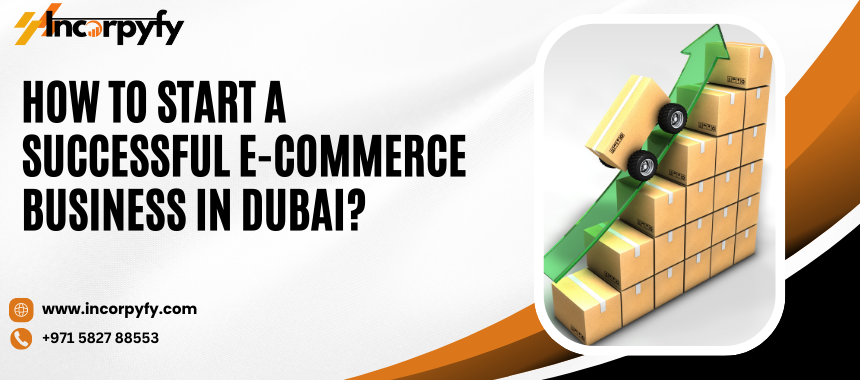
In the rapidly evolving digital age, e-commerce has emerged as a game-changer, revolutionizing how businesses operate and consumers shop. Dubai, a global hub for innovation and entrepreneurship, presents a fertile ground for aspiring e-commerce entrepreneurs. With a tech-savvy population, robust infrastructure, and a business-friendly environment, the emirate offers immense opportunities to establish an online business. This comprehensive guide will explore the essential steps to start a successful e-commerce business in Dubai, ensuring you stay ahead of the curve in 2024 and beyond.
Step 1: Market Research
Conducting thorough market research is the foundation of any successful business venture, and e-commerce is no exception. To thrive in the competitive e-commerce landscape, you must identify your target audience, understand their preferences, and analyze market trends. Here are some key aspects to consider during your market research:
- Target Audience: Define your target audience based on demographic factors such as age, gender, location, and income level. Understand their buying behaviours, preferences, and pain points to tailor your products and services accordingly.
- Industry Analysis: Conduct an in-depth analysis of the industry you plan to enter. Identify key players, their offerings, pricing strategies, and market share. This will help you identify gaps and opportunities to differentiate your e-commerce business.
- Competitor Analysis: Closely examine competitors’ strengths, weaknesses, and unique selling propositions (USPs). This will enable you to position your business effectively and develop a competitive edge.
- Trend Analysis: Stay up-to-date with the latest trends in the e-commerce industry, including consumer preferences, technological advancements, and emerging business models. This will help you stay ahead of the curve and adapt to changing market dynamics.
Thorough market research will help you develop a solid business plan and inform your product selection, pricing strategies, and marketing efforts, increasing your chances of success in the competitive e-commerce landscape.
Step 2: Company Setup in Dubai
Once you’ve completed your market research and developed a solid business plan, it’s time to navigate setting up your e-commerce business in Dubai. The emirate offers various options for business setup, each with its own advantages and requirements. Here are some popular choices:
- Dubai Mainland Company Setup: Establishing a mainland company allows you to operate your e-commerce business within the UAE. This option provides greater flexibility but may involve higher setup costs and additional regulatory requirements.
- Free Zone Company Setup: Dubai’s free zones offer attractive incentives, such as 100% foreign ownership, tax exemptions, and streamlined setup processes. Popular free zones for e-commerce businesses include Dubai Multi Commodities Centre (DMCC), Dubai Silicon Oasis (DSO), and Dubai CommerCity.
- Freelance or Professional License: Obtaining a freelance or professional license can be cost-effective for smaller e-commerce operations or individuals. However, it may limit the scope of your business activities.
Regardless of your option, it’s crucial to comply with all legal requirements and obtain the necessary licenses and permits. Consulting with experienced business setup consultants can help you navigate the process efficiently and ensure compliance with local regulations.
Step 3: Create Your E-commerce Website
Your e-commerce website is your business’s virtual storefront, and its design, functionality, and user experience can significantly impact your success. Here are some essential considerations when creating your e-commerce website:
- Platform Selection: Choose a reliable and scalable e-commerce platform that meets your business needs. Popular options include Shopify, WooCommerce, Magento, and BigCommerce. Consider factors like ease of use, customization options, and integration capabilities.
- User Experience (UX): Prioritize a seamless and intuitive user experience for your customers. Ensure your website is responsive, visually appealing, and easily navigable across various devices.
- Product Catalog and Descriptions: Present your product catalogue in an organized and visually appealing manner. Provide detailed and accurate product descriptions, high-quality images, and essential information such as pricing, availability, and shipping options.
- Secure Payment Gateway: Integrate a secure and reliable payment gateway to ensure smooth and safe customer transactions. Popular options include PayPal, Stripe, and various local payment gateways.
- Mobile Optimization: With the increasing popularity of mobile commerce (m-commerce), ensure that your e-commerce website is optimized for mobile devices, providing a seamless shopping experience for customers.
- Search Engine Optimization (SEO): Implement effective SEO strategies to improve your website’s visibility in search engine results, driving organic traffic and potential customers to your online store.
Creating a user-friendly, secure, and optimized e-commerce website can provide an exceptional shopping experience for your customers, fostering brand loyalty and driving sales.
Step 4: Choose the Right Payment Gateway
Selecting the right payment gateway is crucial for the success of your e-commerce business in Dubai. A reliable and secure payment gateway ensures smooth transactions and builds customer trust and confidence. Here are some factors to consider when choosing a payment gateway:
- Security and Compliance: Ensure that the payment gateway you choose fully complies with local and international security standards, such as PCI-DSS (Payment Card Industry Data Security Standard). This will protect your customers’ sensitive payment information and mitigate the risk of fraud.
- Accepted Payment Methods: Consider the payment methods preferred by your target audience. In Dubai and the UAE, popular options include credit/debit cards, mobile wallets (e.g., Apple Pay, Google Pay), and online banking.
- Integration and Compatibility: Ensure the payment gateway seamlessly integrates with your e-commerce platform and other business systems, such as accounting software and inventory management tools.
- Transaction Fees: Compare the transaction fees charged by different payment gateways and choose one that aligns with your business model and profitability goals.
- Customer Support: Reliable customer support is essential, especially when dealing with payment-related issues or disputes. Look for a payment gateway provider with responsive and knowledgeable customer service.
Some popular payment gateway options for e-commerce businesses in Dubai include PayPal, Checkout.com, Tap, and various local banking solutions like Emirates NBD, Dubai Islamic Bank, and First Abu Dhabi Bank (FAB).
Step 5: Logistics and Shipping
Efficient logistics and shipping are critical components of a successful e-commerce business, ensuring timely delivery and customer satisfaction. In Dubai, you can access world-class logistics and shipping companies facilitating seamless order fulfilment. Here are some key considerations:
- Warehouse and Inventory Management: Determine whether you will handle inventory management in-house or outsource to a third-party logistics (3PL) provider. Consider factors such as storage space, order processing, and inventory tracking.
- Shipping Partners: Establish partnerships with reputable shipping companies in Dubai, such as DHL, FedEx, and Aramex. These companies offer reliable and efficient shipping solutions for domestic and international deliveries.
- Shipping Rates and Policies: Communicate your shipping rates, policies, and delivery timeframes to your customers. To cater to different customer preferences, offer various shipping options, such as standard, express, or same-day delivery.
- Returns and Exchanges: Develop a transparent and customer-friendly returns and exchange policy. Partner with shipping companies that facilitate easy and convenient return processes enhancing customer satisfaction and loyalty.
- Track and Trace: Implement a robust tracking system that allows customers to monitor the status of their orders in real time. This transparency builds trust and enhances the overall customer experience.
By partnering with reliable logistics and shipping companies in Dubai and implementing efficient processes, you can ensure timely delivery, minimize shipping-related issues, and provide a seamless shopping experience for your customers.
Step 6: Marketing and Advertising
In the highly competitive e-commerce landscape, effective marketing and advertising strategies are crucial for attracting and retaining customers. Dubai offers many opportunities to promote your e-commerce business and reach your target audience. Here are some marketing and advertising channels to consider:
- Social Media Marketing: Leverage the power of social media platforms like Facebook, Instagram, Twitter, and LinkedIn to build brand awareness, engage with your audience, and drive traffic to your e-commerce website.
- Influencer Marketing: Partner with influential social media personalities, bloggers, or industry experts who align with your brand and target audience. Influencer marketing can help you reach a highly engaged and relevant audience.
- Search Engine Marketing (SEM): Implement effective SEM strategies, including pay-per-click (PPC) advertising on platforms like Google Ads and Bing Ads, to drive targeted traffic to your e-commerce website.
- Email Marketing: Build an email list of potential and existing customers and leverage email marketing campaigns to promote new products and offer exclusive deals.
Step 7: Customer Service and Support
Exceptional customer service and support are vital for building trust, fostering loyalty, and ensuring long-term success in the e-commerce industry.
Implement multichannel support options, including live chat, email, and phone support, to promptly address customer inquiries and concerns. Train your customer service team to handle queries professionally and efficiently, and consider offering incentives or loyalty programs to reward loyal customers.
Step 8: Continuous Improvement and Adaptation
The e-commerce landscape constantly evolves, with new trends, technologies, and consumer preferences emerging regularly. Stay ahead by continuously monitoring industry developments, analyzing customer feedback, and adapting your strategies accordingly.
Update your website, product offerings, and marketing campaigns regularly to align with the latest trends and consumer demands. Embrace emerging technologies like artificial intelligence, augmented reality, and voice commerce to enhance the shopping experience and gain a competitive edge.
Conclusion
Starting a successful e-commerce business in Dubai requires careful planning, strategic execution, and a commitment to providing an exceptional customer experience. By following the steps outlined in this guide, you’ll be well-equipped to navigate the challenges and seize the opportunities in Dubai’s dynamic e-commerce landscape.
Remember, at Incorpyfy, we are dedicated to supporting entrepreneurs like you in establishing their businesses in Dubai. Our expertise lies in providing comprehensive business setup services, ensuring compliance with local regulations, and guiding you through the process.
Contact us if you’re ready to embark on your e-commerce journey in Dubai. Let’s discuss how we can collaborate to make your dream a reality.





